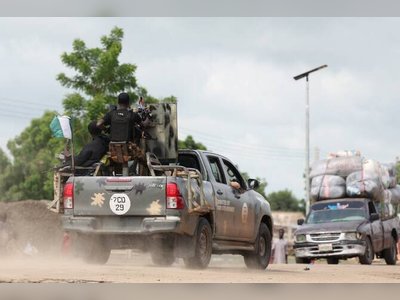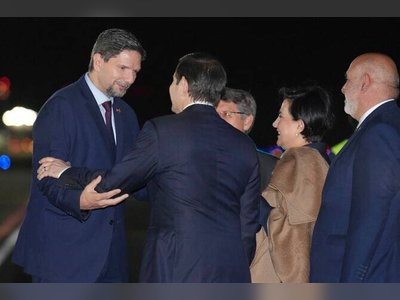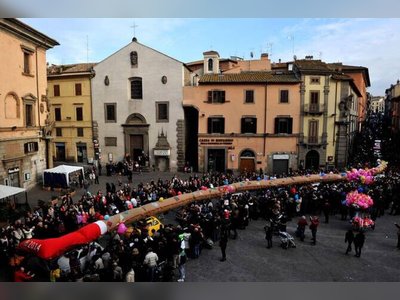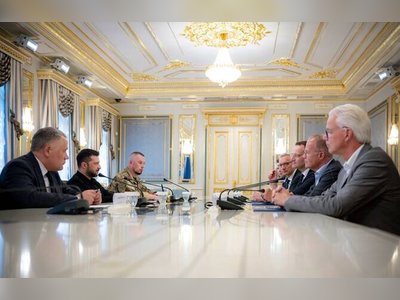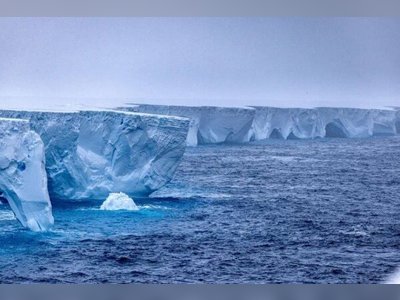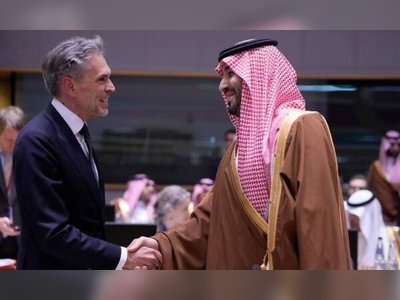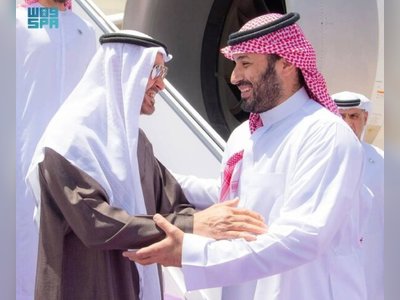
European leaders face tough choices as coalition discusses security guarantees for post-war Ukraine
The war rages on, with no ceasefire in sight, and the crucial question of American involvement in ensuring Ukraine's future security remains unresolved.
European countries are stuck between a rock and a hard place as a coalition of countries meets in Paris on Thursday to discuss security guarantees for a post-war Ukraine.
The war is raging unabated, with no ceasefire in sight — and the crucial question of American involvement in ensuring Ukraine's future security remains unresolved.
For months, the so-called "coalition of the willing" has been meeting to discuss aid for Ukraine, including sketching out plans for military support in the event of a ceasefire to deter future Russian aggression.
The coalition leaders — French President Emmanuel Macron and U.K Prime Minister Keir Starmer — have insisted that any European "reassurance" force in Ukraine needs the backing of the United States.
But while US President Donald Trump has hinted his country will be involved, he has moved away from calling for a ceasefire in Ukraine and refrained from implementing tough additional economic measures to punish Moscow.
Although Trump said he is "disappointed" in Russian President Vladimir Putin and issued several threats to try to cajole him into negotiating an end to hostilities, none have worked.
At a meeting with Putin in Alaska in August, Trump failed to persuade the Russian leader to stop fighting and has not yet managed to broker talks between Putin and Ukraine's President Volodymyr Zelensky.
While Trump and European leaders met in Washington after the Alaska summit — and US, European and NATO military chiefs held discussions on support for Ukraine — little concrete detail has emerged on the security guarantees to deter Moscow from a future conflict.
Former military generals and experts suggest Europe is in a bind — not knowing the level of support the US is prepared to provide the coalition, the nature of any ceasefire or if the US will abide by commitments made.
It's also far from certain that Putin would agree to a cessation of hostilities, something Russian officials have invariably dismissed.
"Talking about detailed operational planning when you don't actually have your mission is, quite frankly, impossible," said Ed Arnold, an expert in European Security at the Royal United Services Institute in London and a former military planner.
Why Europeans believe a ceasefire is necessary
The "coalition of the willing" is a broad term for about 30 nations supporting Ukraine, but the so-called "reassurance force" that would provide security guarantees to Kyiv is a subset of that group.
The UK, France and Estonia have all suggested they are ready to deploy troops to Ukraine to deter Putin from attacking again, while officials in Poland said Warsaw will not take part and will instead focus on bolstering NATO security in the east of Europe.
There is "no suggestion" that any troops will be deployed without a ceasefire because it's too risky, said François Heisbourg, special adviser at the Foundation for Strategic Research in Paris.
Despite Zelensky signaling his willingness to talk, a ceasefire agreement is not currently in the cards — not least because of the positions of the US and Russian presidents.
At his Aug. 18 meeting with European leaders at the White House — a day after meeting Putin — Trump walked back his previous demands for a ceasefire in Ukraine and said he thought a peace agreement was preferable.
The comments marked a shift toward the Russian position from Trump and would allow Moscow to fight on in Ukraine while peace negotiations are underway.
Russian Foreign Minister Sergey Lavrov later suggested an end to hostilities was even further away, stating that Moscow will not accept Zelensky's signature on any peace agreement as Russia considers him to be an illegitimate president.
"If Putin doesn't want a ceasefire — and if Trump doesn't call for a ceasefire — what are the chances of a ceasefire happening?" asked Heisbourg.
What a European security guarantee for Ukraine could look like
Even if a ceasefire or peace agreement for Ukraine were implemented, it's not clear it would be a sufficient deterrent to Putin and would be "very, very risky" for European nations, said Arnold at RUSI.
Such an operation hinges on the US providing intelligence support and the deterrent effect of US airpower in countries outside Ukraine.
The Western appetite to potentially shoot down Russian missiles violating a ceasefire or target launchers firing them from within Russia is "close to zero," said Heisbourg.
Any response to a ceasefire violation, he said, would likely depend on "how many Western soldiers the Russians would have actually killed...and nobody wants to think about that too much in advance."
The war is raging unabated, with no ceasefire in sight — and the crucial question of American involvement in ensuring Ukraine's future security remains unresolved.
For months, the so-called "coalition of the willing" has been meeting to discuss aid for Ukraine, including sketching out plans for military support in the event of a ceasefire to deter future Russian aggression.
The coalition leaders — French President Emmanuel Macron and U.K Prime Minister Keir Starmer — have insisted that any European "reassurance" force in Ukraine needs the backing of the United States.
But while US President Donald Trump has hinted his country will be involved, he has moved away from calling for a ceasefire in Ukraine and refrained from implementing tough additional economic measures to punish Moscow.
Although Trump said he is "disappointed" in Russian President Vladimir Putin and issued several threats to try to cajole him into negotiating an end to hostilities, none have worked.
At a meeting with Putin in Alaska in August, Trump failed to persuade the Russian leader to stop fighting and has not yet managed to broker talks between Putin and Ukraine's President Volodymyr Zelensky.
While Trump and European leaders met in Washington after the Alaska summit — and US, European and NATO military chiefs held discussions on support for Ukraine — little concrete detail has emerged on the security guarantees to deter Moscow from a future conflict.
Former military generals and experts suggest Europe is in a bind — not knowing the level of support the US is prepared to provide the coalition, the nature of any ceasefire or if the US will abide by commitments made.
It's also far from certain that Putin would agree to a cessation of hostilities, something Russian officials have invariably dismissed.
"Talking about detailed operational planning when you don't actually have your mission is, quite frankly, impossible," said Ed Arnold, an expert in European Security at the Royal United Services Institute in London and a former military planner.
Why Europeans believe a ceasefire is necessary
The "coalition of the willing" is a broad term for about 30 nations supporting Ukraine, but the so-called "reassurance force" that would provide security guarantees to Kyiv is a subset of that group.
The UK, France and Estonia have all suggested they are ready to deploy troops to Ukraine to deter Putin from attacking again, while officials in Poland said Warsaw will not take part and will instead focus on bolstering NATO security in the east of Europe.
There is "no suggestion" that any troops will be deployed without a ceasefire because it's too risky, said François Heisbourg, special adviser at the Foundation for Strategic Research in Paris.
Despite Zelensky signaling his willingness to talk, a ceasefire agreement is not currently in the cards — not least because of the positions of the US and Russian presidents.
At his Aug. 18 meeting with European leaders at the White House — a day after meeting Putin — Trump walked back his previous demands for a ceasefire in Ukraine and said he thought a peace agreement was preferable.
The comments marked a shift toward the Russian position from Trump and would allow Moscow to fight on in Ukraine while peace negotiations are underway.
Russian Foreign Minister Sergey Lavrov later suggested an end to hostilities was even further away, stating that Moscow will not accept Zelensky's signature on any peace agreement as Russia considers him to be an illegitimate president.
"If Putin doesn't want a ceasefire — and if Trump doesn't call for a ceasefire — what are the chances of a ceasefire happening?" asked Heisbourg.
What a European security guarantee for Ukraine could look like
Even if a ceasefire or peace agreement for Ukraine were implemented, it's not clear it would be a sufficient deterrent to Putin and would be "very, very risky" for European nations, said Arnold at RUSI.
Such an operation hinges on the US providing intelligence support and the deterrent effect of US airpower in countries outside Ukraine.
The Western appetite to potentially shoot down Russian missiles violating a ceasefire or target launchers firing them from within Russia is "close to zero," said Heisbourg.
Any response to a ceasefire violation, he said, would likely depend on "how many Western soldiers the Russians would have actually killed...and nobody wants to think about that too much in advance."
